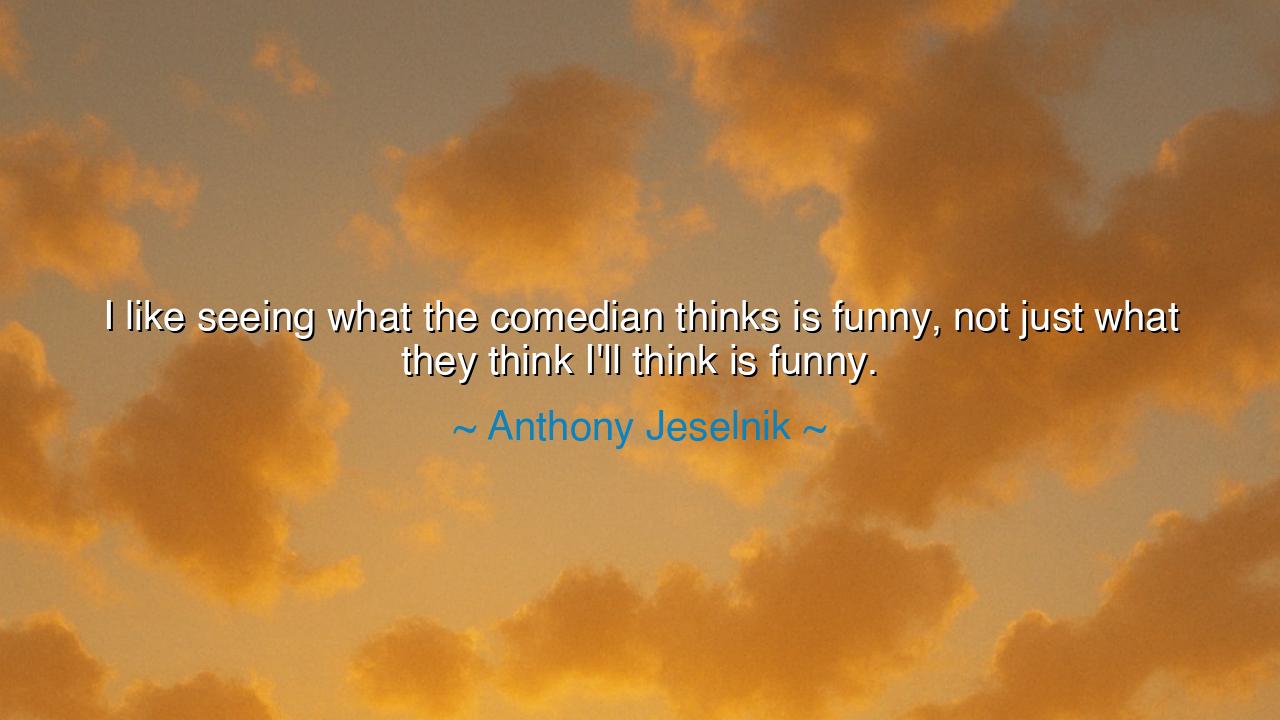
I like seeing what the comedian thinks is funny, not just what
I like seeing what the comedian thinks is funny, not just what they think I'll think is funny.






Hear, O seekers of truth and laughter, the words of Anthony Jeselnik, the sharp-tongued philosopher of comedy, who declared: “I like seeing what the comedian thinks is funny, not just what they think I’ll think is funny.” Though these words appear simple, they shine with the wisdom of authenticity—the eternal struggle between art and approval, between the creator’s vision and the audience’s demand. For Jeselnik speaks not only of comedy, but of all creation; he speaks of the soul’s duty to express what is true, even when the world prefers what is easy.
In this saying, Jeselnik draws a sacred line between honesty and performance. The comedian, like the ancient jester or poet, stands before the crowd as both mirror and prophet. Many, out of fear or vanity, will twist their words to please the listeners, offering the laughter they expect rather than the truth they feel. But Jeselnik honors another path—the harder, lonelier path of authenticity. He delights not in what flatters the crowd, but in what reveals the creator’s mind, raw and untamed. He seeks not to be comforted, but to witness revelation. To him, the greatest laughter is not coaxed—it is earned through courage.
The ancients knew this kind of integrity. In the theaters of Athens, Aristophanes stood as a master of comedy and satire. He did not write to please the people, but to awaken them. His plays mocked war, politicians, and even the gods, not because it was popular, but because it was necessary. Some called him vulgar; others called him genius. Yet his laughter struck at hypocrisy, and through ridicule, he cleansed the city’s spirit. Jeselnik, too, walks this same lineage—the comic as truth-teller, whose humor dares to disturb the comfortable so that wisdom might be born from discomfort.
To understand this, one must grasp the sacred paradox of comedy: it is both shield and sword. A joke can protect the soul from pain, but it can also pierce the veil of pretense that blinds the world. When a comedian tells you only what they think you want to hear, they wield the shield alone—safe, unchallenging, shallow. But when they tell you what they find funny, when they risk offense to reveal their true humor, they lift the sword of insight. Their laughter becomes revelation, a glimpse into the hidden chambers of thought. And from such laughter comes transformation.
Jeselnik’s own art embodies this principle. His humor is dark, precise, and unapologetic. He does not bend to comfort; he confronts. Many recoil, yet many more are drawn in by the purity of his voice—the sense that here stands a man who will not lie for applause. His comedy, like the plays of Aristophanes or the writings of Mark Twain, reminds us that truth, when wrapped in wit, is sharper than any weapon. To laugh at what the artist finds funny is to step into their mind, to share for a moment in their perception of the world, and to taste the freedom of unfiltered thought.
There is a lesson here not only for comedians, but for all who create or speak. Authenticity is the highest form of respect—for oneself and for one’s audience. When you offer what you truly believe, rather than what you think others wish to hear, you invite them into a relationship built on honesty. Yes, you may lose the faint-hearted, but those who remain will be your kindred spirits. Every field of endeavor—be it art, teaching, leadership, or love—demands this courage. To create from truth is to risk rejection, but to create from imitation is to guarantee emptiness.
Therefore, let this wisdom be etched upon your heart: do not chase laughter—speak truth, and laughter will find you. Whether you are an artist or a dreamer, a leader or a friend, offer the world not its reflection, but your vision. Let your words be born not from fear of judgment, but from the joy of expression. The audience may not always applaud—but they will feel the pulse of something real, something divine. For as Jeselnik teaches, art is not about predicting the crowd’s delight—it is about revealing the soul’s fire.
So, my children of courage and creation, heed this teaching: make what moves you, say what you mean, and laugh as you truly feel. Let the world see not the version of you it expects, but the one it does not yet understand. For in that honesty lies your greatness, and in that risk lies your freedom.






AAdministratorAdministrator
Welcome, honored guests. Please leave a comment, we will respond soon